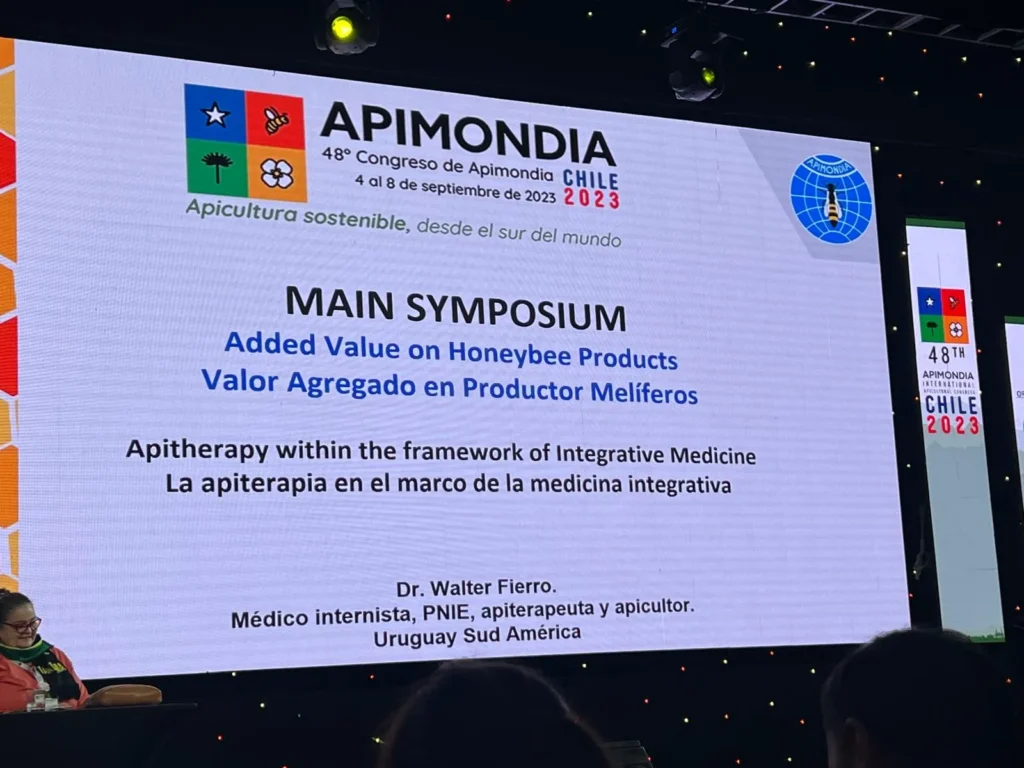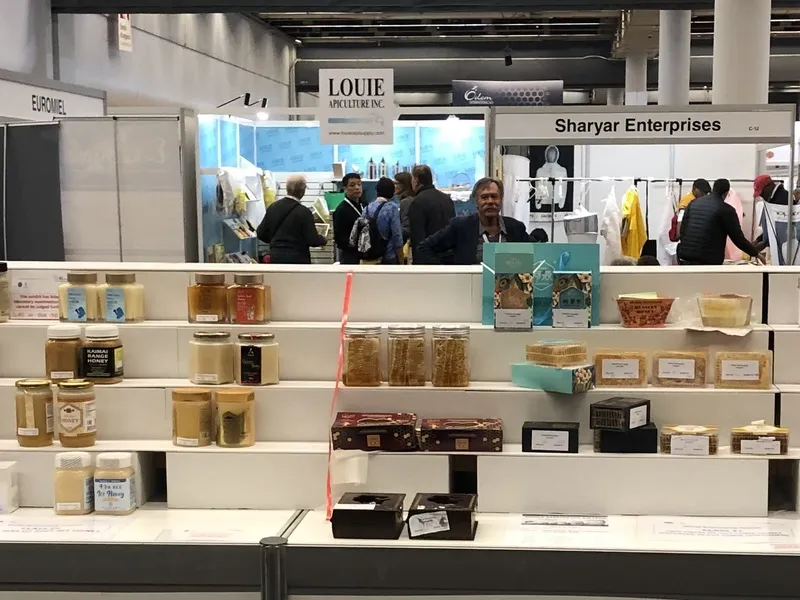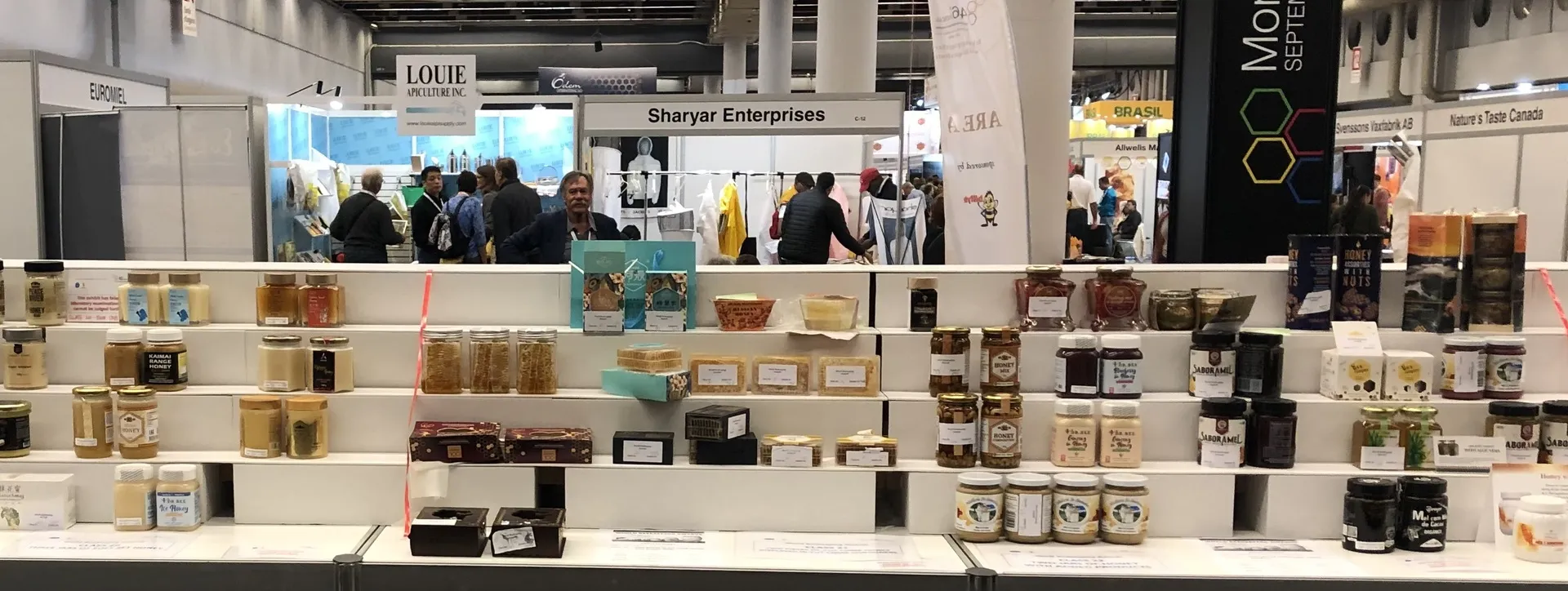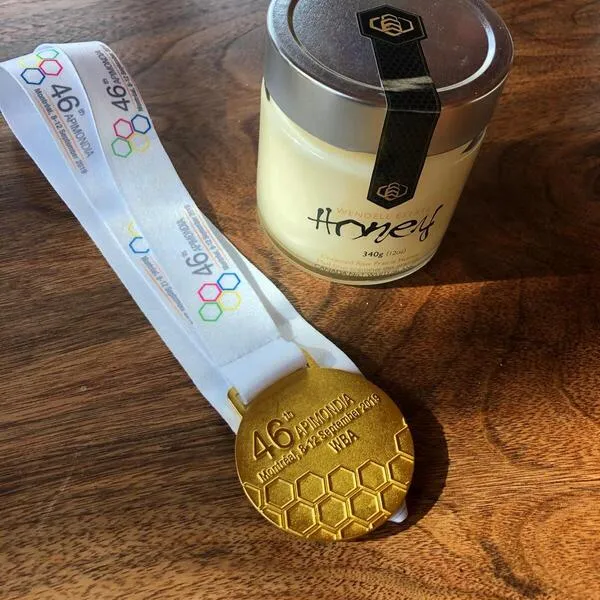
Another World Beekeeping Awards Medal for Wendell Estate Honey
The World Beekeeping Awards (WBA) are held every two years in conjunction with Apimondia, The World Beekeeping Congress, the most important, prestigious global event in the industry. The most recent WBA was held in September 2023 in Santiago, Chile. This is hardly late-breaking news, but perhaps it is timely with the opening of the Paris Olympics. In the beekeeping world, the World Beekeeping Awards might be analogous to the “Olympics of Beekeeping”. Participants from around the world enter their honey and bee products in hopes of winning a medal at this industry-leading event and it’s acocompanying awards.
Tim & Apimondia
There are few things that Wendell Estate Honey founder and Wendell Honey farm owner, Tim Wendell, enjoys more than attending beekeeping conferences to discuss everything beekeeping-related with other beekeepers. He attended Apimondia 2023 and entered Wendell Estate Honey into the World Beekeeping Awards.
Tim last attended Apimondia in 2019 in Montreal, where Wendell Estate Honey took home the gold medal in its category of soft-set honey. Wendell Estate Honey celebrated this great unexpected honor. Tim was planning to attend the Congress in 2021 which was to be held in Ufa, Russia. The Ukrainian war broke out prior to Apimondia and it was hastily re-organized to Istanbul, Turkey, leaving Tim unable to attend.
There were some changes in the way the competition was run between 2019 and 2023. In 2019 all honeys were tested for adulteration and contamination by an independent laboratory specializing in honey, prior to judging, with fully 46% of honeys being disqualified. The largest reason for disqualification was the presence of syrups of processed sugars (adulteration).1 This came as quite a shock to everyone involved. The judges assessed the honeys that passed laboratory quality inspections and awarded a single gold, silver and bronze medal in each category, with the exception that gold medals were withheld in some categories were the best entrant was not deemed exceptional enough to merit a gold medal. In 2023, some categories had multiple winners of some medals. Overall, 30 of the 190 registered honeys received medals. Another difference between the WBA in Montreal and in Santiago was that the honeys were judged first and then only those judged exceptional enough to receive a medal were submitted to a battery of test by an independent laboratory2. Of the tested honeys, a whopping 52% were disqualified for a variety of reasons including high moisture content (26%), exposure to temperatures above 50°C/122°F (28%), presence of contaminants (antibiotics and agricultural chemicals – 13%) and presence of sugar syrups (adulteration – 8%).

A Gold Medal Win is a Tough Act to Follow
Awards were not finalized during Apimondia, likely at least in part due to pending laboratory test results. Spring came, the honey farm got busy, and we all mostly forgot about the World Beekeeping Awards. In the end, Wendell Estate Honey won a bronze medal in the soft-set honey category.
We’ll admit that there was a tinge of disappointment on receiving a bronze on the heels of our gold at the World Beekeeping Awards in 2019 . However, on further reflection, we’re proud of our bronze medal. Unlike many “awards” given out by for-profit marketing organizations in which every paid entrant “wins” an award, the World Beekeeping Awards are a legitimate, competitive award. With experienced beekeepers from around the world bringing their best honeys, competition is as fierce as it gets in the honey world and only a fraction of the world-class honeys that enter win a medal in their category.
WBA 2023 offers insights into some disconnect between objectively measured honey quality parameters (laboratory testing) and expert evaluation of the organoleptic (sensory) qualities of honey with a slight majority of honeys chosen by the judges being disqualified by honey quality reasons.


Insights from Wine Tastings?
It is not surprising that subjectivity and disagreement exists even among expert human judges. I am reminded of wine tasting. As somebody who loves red wine, but was completely uneducated, I had assumed wine tasting and grading were almost entirely subjective. Then a couple oenophile friends of mine invited me to join their bi-monthly blind wine tasting sessions. I was simultaneously honored, skeptical and somewhat intimidated. I knew next to nothing about wines except that I thought many of them tasted good. I had a few go-to “daily drinker” reds and a handful of more expensive favorites for a splurge. In retrospect, I think my friends just needed another person to help them buy and drink the wine: the tastings usually involved 4 or 5 bottles of premium wine, a little extravagant for 2 people. For our first tasting I contributed to the 4 bottles of expensive Italian red wine, but also brought a cheap generic bottle of red from a local convenience store. I thought that if I can’t tell which is the cheapo in a blind test, that would be somewhat humiliating, but also great news for me economically. If my more experienced friends couldn’t identify the plonk, it would confirm my thoughts that wine “goodness” was purely subjective, no matter how much the wine snobs believed in it.

My friends humored me and added the plonk into the blind tasting. In the blind tasting, we all knew which wines were involved, but we didn’t know which wine was poured into each of the numbered glasses. After carefully swirling, sniffing and sipping the first 3 glasses, I could appreciate that each wine had its own complex character, with different bouquets of aromas and flavors, which evolved on the tongue and palate. However, my palate was far too inexperienced, my wine vocabulary too limited to describe the differences accurately. My more experienced friends would share thoughts like “Number 2 needs a couple more years.” or “Wow! The tannins in number 3 are incredible. Amazing structure.” Or “I get peat, leather and barnyard in glass 1, with a hint of dark berries.” They almost always agreed. Meanwhile, I hadn’t the slightest idea of which one might be the 13-year-old, 93-point Brunello, which was the 19-year-old, 91-point Barolo or one of the other vintage premium Italian “Super Tuscans”, and which was the cheap plonk. Then I sampled glass number 4. Surprisingly little to appreciate by smelling. The moment it touched my tongue, the contrast was shocking: thin, metallic, artificial fruit flavor, chemical, alcohol were the adjectives that leapt to mind. Cheap plonk. My friends got a laugh out of my surprised enlightenment: They had introduced me to the Epicurean joys of fine wine.
Appreciating Both the Objective and Subjective "Goodness"
Like wine (or coffee, or tea, or scotch, or cheese, or wild mushrooms), honey is a food of tremendous diversity and complexity. Unless it isn’t. In these days of convenience and cheap foods; Amazon and Walmart; marketing over quality, many honeys are blended and processed to cut costs, increase profits, maximize convenience and shelf life, and provide a characterless, but consistent experience at a low price. In other words, cheap plonk. I doubt any self-respecting beekeeper would bring cheap plonk to the World Beekeeping Awards. I can’t imagine the reaction on a judges faces if somebody slipped processed, discount, mass-produced supermarket honey into the competition. Surely it would be a combination of shock and confusion: “What’s going on here?!”. I’ve come to learn that there are certainly objective criteria against which subjective things like food and art and literature can be judged.
While my wine-tasting buddies mostly agreed in their assessments of the flavour and quality profile of each glass of wine, they almost never agreed on which wine they liked the most. Of course nobody’s favorite would ever be the cheap plonk, but among the good wines, preferences differed dramatically. Russ tended to prefer the more mature, more complex character, usually older and old-world wines with less fruitiness, while Dan preferred more fruit notes and assertiveness, liking the new world reds and sweeter whites more. Over time I came to realize that my “Goldilox” preferences lay somewhere between Dan and Russ. Likewise, while experts will unanimously dismiss “plonk”, wine and honey judges are almost certainly swayed by their subjective personal preferences to some degree when scoring top-quality medal contenders.
In Closing
Passing the rigorous battery of laboratory tests of the World Beekeeping Awards comes as no surprise to us: we know what’s in our honey. Standing as an equal among all the wonderful raw honeys from around the world at the World Beekeeping Awards is an honor. Winning a medal is icing on the cake.

Notes
1. Adulteration of natural honey by cheaper, unhealthy syrups of processed sugars is one of the major existencial issues facing North American beekeepers today. Not only does it defraud the consumer, it artificially drives down the price of authentic pure bulk and retail honey by competing with them, threatening many honey producers ability to continue. Honey is the third most adulterated food on the planet. Government agencies on both sides of the border have implemented measures to detect and penalize honey fraud, but the effectiveness has been limited to date. This recent article attests to the continuing pervasiveness of the issue of honey fraud. Similar reports come from USA, India and around the world. The fact that competing with fake honey is driving honey producers out of business could be more serious than many consumers recognize. Honey bees are not native to North America. Without beekeepers, there will be no honeybees in North America. One thing consumers can try to do to actually help beekeepers and honeybees is try to purchase only real, authentic honey. Real, raw honey sourced from North America (i.e. not USDA organic honey) is a good way to support domestic bees and beekeepers.
2. On the World Beekeeping Awards official communication it does not explain why the change from laboratory testing of all entrants, versus only testing top-ranked entrants after the judging. My uneducated guess may have been that it was a costs savings measure: running a battery of laboratory tests on a sample of honey easily runs into the hundreds of dollars. The result is that we’re left with an incomplete picture of the overall composition of the entrants. However, the results among the top-scored honeys was still surprisingly eye-opening in the numbers that failed basic laboratory quality and authenticity parameters. This at a high-profile competition where entrants were well-aware that their honey would be subject to testing.
Jeremy Wendell
Share this story
